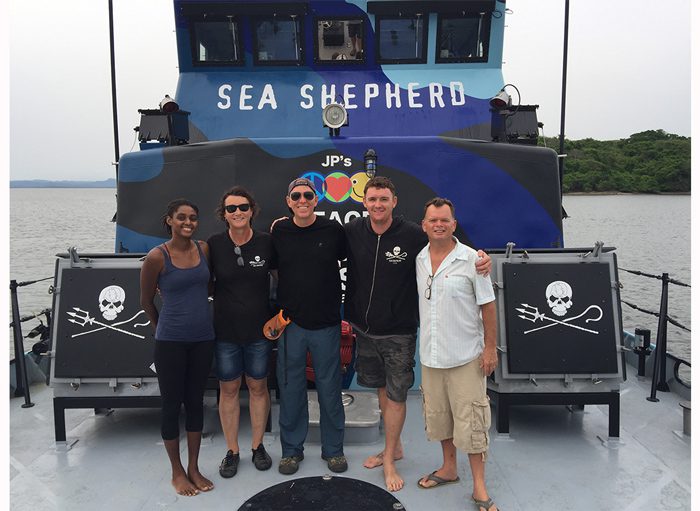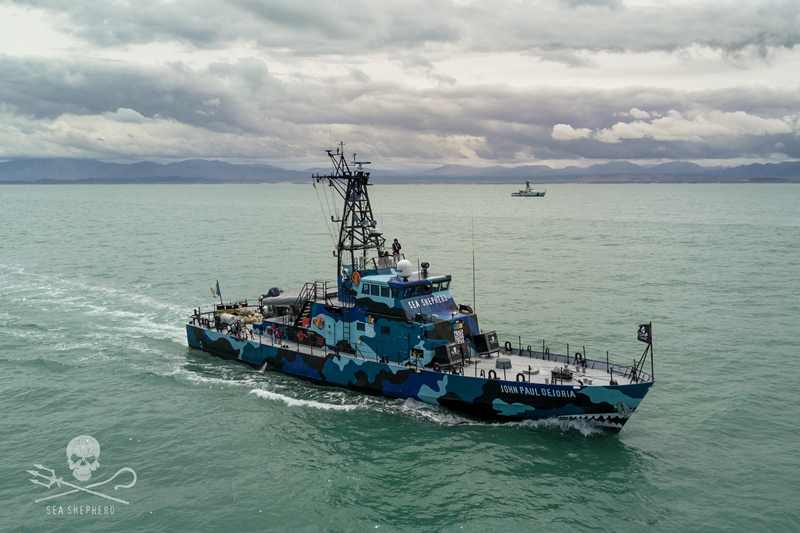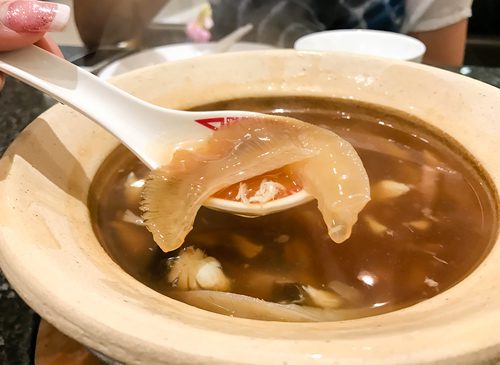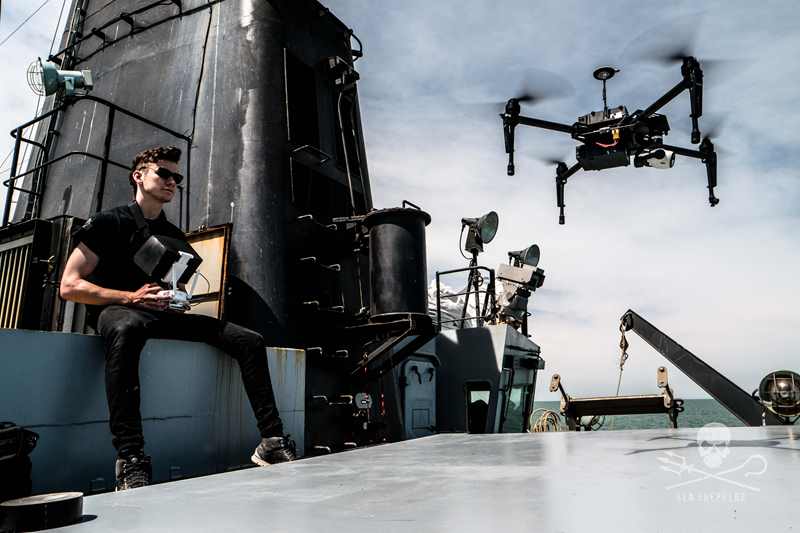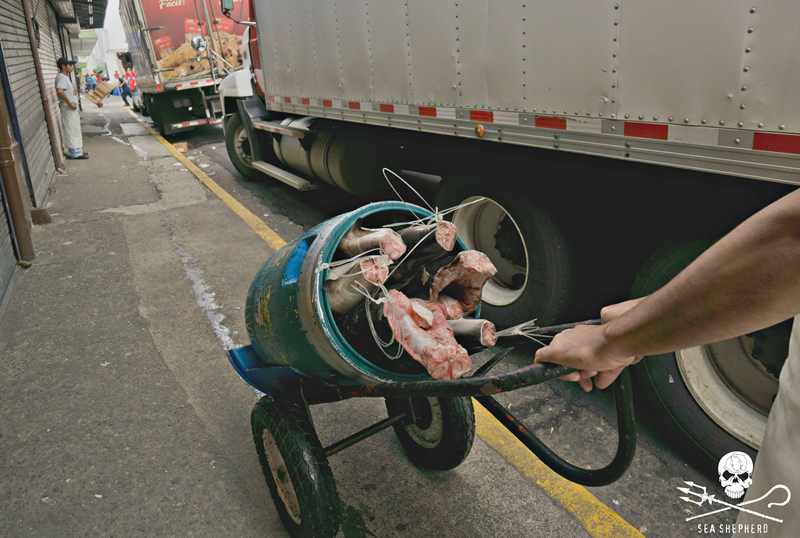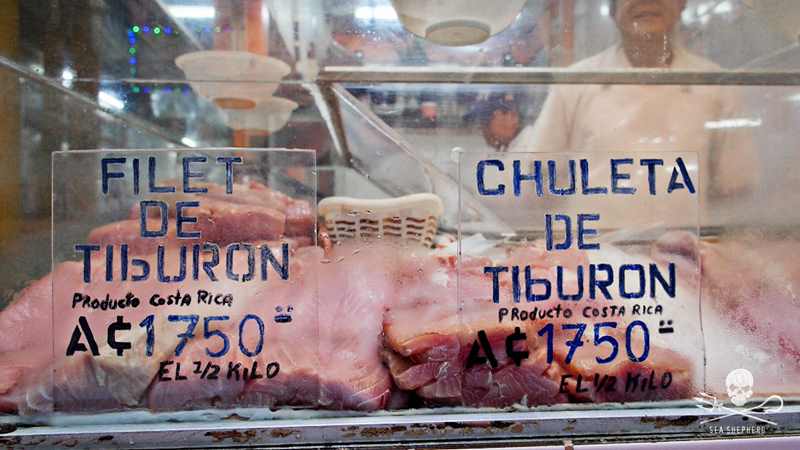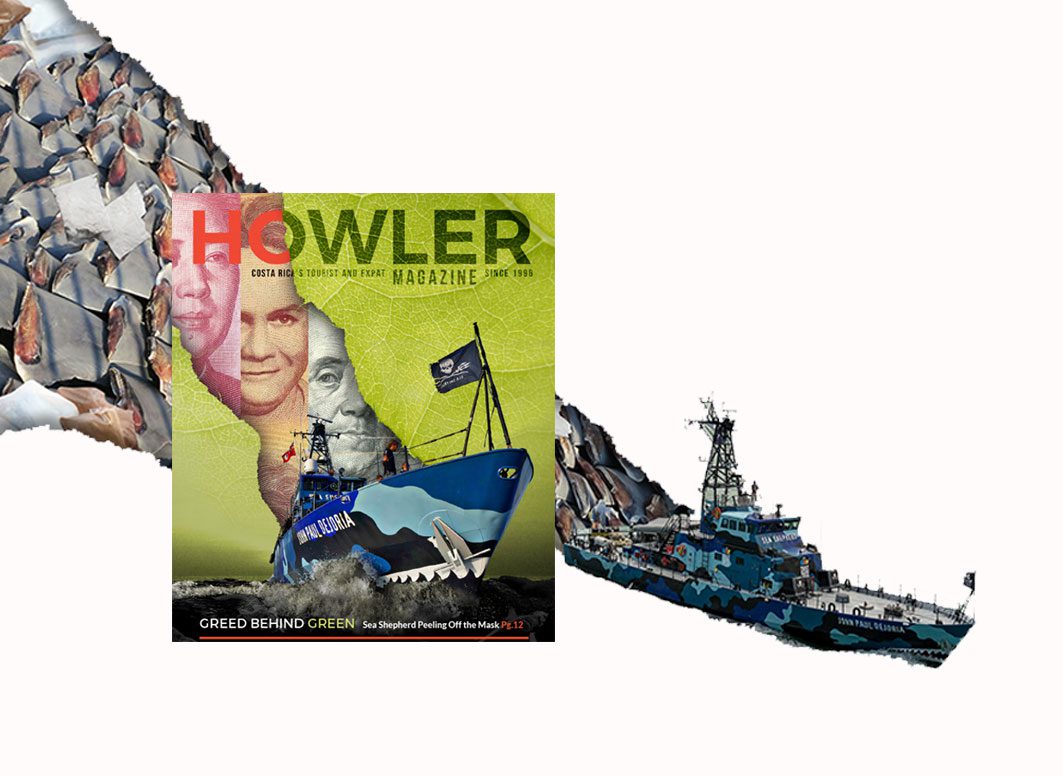
Behind The Green Mask – Cocaine and Shark Fins, Corruption and Costa Rica
Sixteen years ago, in 2001, I took my ship Ocean Warrior to Cocos Island, Costa Rica. Upon arriving we found an Ecuadorian longliner, the San Jose, busily slaughtering sharks not far off the beach of Cocos Island National Park. The rangers were watching from the shore, but not having a boat, could do nothing. We offered our help and together, the Cocos Island rangers and the Sea Shepherd crew stopped the San Jose, confiscated many kilometers of long lines and hundreds of dead sharks. We then assisted with the arrest of the crew.
The San Jose was the first large illegal fishing boat caught and stopped in the Cocos Island Marine Reserve, and the first illegal fishing vessel to be confiscated by the Costa Rican courts.
Because of that arrest, I signed a formal agreement with the Costa Rican Ministry of the Environment to begin patrolling the Cocos Island Marine Reserve in partnership with the rangers, beginning in 2002.
Two years earlier, in 2000, Sea Shepherd had begun a similar partnership with the Galapagos National Park and the Ecuadorian Federal Police – a partnership that continues 17 years later.
Unfortunately, our partnership with Costa Rica stopped before it even had a chance to begin. The same year we signed the agreement to patrol Cocos Island, my crew and I caught a Costa Rican poaching vessel, the Varadero I, in Guatemalan territorial waters. At the request of the Guatemalan authorities, we stopped the poachers’ illegal activities. We caught and filmed them in the act of catching and finning sharks. We stopped them with fire hoses. No one was hurt and there was no damage to the vessel. A film crew onboard working on the documentary film Sharkwater documented the entire incident.
The eight fishermen onboard the Varadero I reported to Costa Rican authorities that we tried to murder them. They had no evidence and no documentation, just their word against the 30 Sea Shepherd crew members and independent filmmakers who witnessed and documented the event.
I appeared in court in 2002 and our film clearly demonstrated that there was no attempt to murder the fishermen. That charge was dismissed. A week later I was charged once again with eight counts of assault. Once again our film disproved these charges and they were dismissed. I was given clearance to depart Costa Rica.
I never heard another word about this until May 2012, when German border guards arrested me in Frankfurt on a Costa Rican extradition warrant. The charge was now stated as something called “shipwreck endangerment.” This arrest was followed immediately by a Japanese extradition request. Japan wanted me extradited for “conspiracy to trespass” on a whaling ship and for “obstruction of business.”
Germany made the decision to extradite me to Japan. This gave me no choice but to skip bail and escape to sea, where I spent the next 15 months from August 2012 until the end of October 2013. Because of the two extradition requests and the recognition of these extradition requests by Germany, I was placed on the Interpol Red List in August 2012.
No one has ever been placed on the Interpol Red List for activities that did not cause injury, death or property damage, or the theft of money, state secrets or property. In my case, I had stopped a shark finning operation in Guatemalan waters at the request of the Guatemalan government, and Japan had charged me because of our opposition to their illegal whaling operations (as ruled by the International Court of Justice) in the Southern Ocean.
But let’s consider the Costa Rican extradition request. That 2002 incident involved eight poachers – from a vessel that had already been previously charged and convicted with poaching – bringing in a complaint after we stopped them from poaching. Our film evidence proved in court that their accusations of attempted murder and assault were ridiculous.
The charges were brought against me in the port city of Puntarenas, where illegal fishing was, and continues to be, epidemic. During the initial trial, we discovered and documented the illegal landing of sharks in Puntarenas. It was not hard. The shark fins were being dried in public view. We reported the activity to the police and the authorities did nothing. Instead we were warned not to harass the fishermen.
Why would the court in Puntarenas act so aggressively in responding to a complaint by eight poachers? There was, and is, more behind this. I think the motivating factor is narcotics.
Last year came the revelation that a man named Gilbert Bell had been arrested and fingered as the notorious drug lord “Macho Coca.” Things have now become clearer to me. Gilbert Bell was an advisor to the Costa Rican Institute of Fisheries and Aquaculture (INCOPESCA), a government agency that has been the subject of a few criminal investigations.
More than half the INCOPESCA board is made up of representatives of the fishing industry. In 2012, INCOPESCA’s Vice President Alvaro Moreno was fired for corruption. Since 2011, the current INCOPESCA President has been under criminal investigation for failure to sanction two fishing boats accused of shark finning in six years ago.
In 2014, the US Coast Guard captured a Costa Rican fishing vessel and arrested three Costa Ricans and one Nicaraguan suspect off the coast of Cocos Island. The boat had 2.3 tons of cocaine on board.
“We are more concerned about these [drug trafficking] organizations infiltrating our fishermen or the fishing boats that were once dedicated to fishing and are now dedicated to the trafficking of drugs,” said Public Security Vice Minister Gustavo Mata. “Generally speaking, more of our fishermen are dedicating themselves to coca trafficking.”
However, back in 2001, rangers on Cocos Island told me at that time, that they were very concerned about drugs being transported on fishing vessels. This is not anything new.
Cocos Island is a waypoint for the transportation of drugs and has been for some time.
It is becoming more clear to me that our plans to come to Cocos Island in 2002 for permanent patrols represented a threat to the narco-traffickers. Thus, I believe, charges were laid against me to prevent these permanent patrols from happening. This is also the reason that our offer of two first-rate, fast patrol vessels for Cocos Island has been turned down.
INCOPESCA and other people of influence in Costa Rica do not want eyes and ears anywhere near Cocos Island – not because of illegal fishing but more because of illegal shipments and at-sea transfers of drugs.
The case against me simply does not make sense. Neither the murder nor the assault charges in connection with the 2002 Varadero I incident stood up in court. The eight Costa Rican poachers involved had no evidence to substantiate the charges, while I had solid proof from the documentary film and Sea Shepherd crew eyewitnesses. So when these charges were dismissed and I was given clearance to depart Costa Rica, that should have been the end of it.
Instead, after hearing nothing more for 10 years, I’m arrested in Germany on the charge of “shipwreck endangerment.” The official accusation as it stands now is contradictory. It states that the incident took place in international waters. Yet, it also states an exact position, a position that is well inside Guatemalan waters where Guatemalan law allowed us to intervene against this illegal activity. It can’t be both, yet in the accusation it is stated as such.
The Costa Rican court states there is no evidence that the Costa Rican fishermen were poachers. This is despite the fact that we filmed them poaching, and that in 2001, the Varadero I was arrested and convicted in the Galapagos (Ecuador) for illegal fishing.
The amount of time and effort Costa Rica has invested in this case for over 13 years, with monies from the Costa Rican people, is completely disproportional to a situation where no one was hurt and property was not damaged.
The obvious question is why? For years I have thought that the courts, INCOPESCA and other government officials were protecting poachers. Indeed, there is a great deal of evidence that they have in fact, been protecting poachers. With the arrest of Macho Coca however, I began to think it goes deeper than that. The arrest of drug lord and INCOPESCA advisor Gilbert Bell led me to believe that this is also about protecting the narco-traffickers. Other events support that belief.
In May 2013, turtle conservationist Jairo Mora Sandoval was murdered by narco-poachers at Moins beach. This is a beach that is frequently used to drop off drugs from Colombia and Panama. Jairo’s killers were initially acquitted by the Costa Rican court, not because they were innocent, but because the police and the prosecution conveniently lost crucial evidence. A second trial was motivated by intense public pressure and some of the suspects were found guilty.
Last year, Sea Shepherd crew members protecting turtles were assaulted by poachers at Moins beach. Instead of investigating the assaults, the police harassed the Sea Shepherd crew and searched the Sea Shepherd camp for drugs, scattering and damaging the crew’s property in the process.
Two years ago, Sea Shepherd undertook plans with the Costa Rican Ministry of the Environment to provide assistance once again in defending Cocos Island. Sea Shepherd Global Director Alex Cornelissen was invited to meet with the Ministry and flew to San Jose from the Netherlands to do just that. However, at the last minute the meeting was cancelled. The Ministry’s excuse? They could not work with Sea Shepherd as long as I am wanted by the courts and Costa Rica continues seeking to extradite me.
In April 2017, my court case in Costa Rica was to be dismissed because it had reached the statute of limitations date. My attorney, Abraham Stern, was shocked when he was informed of the court ruling that in my case, there will be no statute of limitations.
Last month, I sent our fast patrol boat the John Paul DeJoria to Costa Rica, with an offer to once again assist the rangers on Cocos Island. Upon arrival, the vessel was boarded by armed Coast Guard officers and their harassment continued until the ship was forced to leave Costa Rica.
The rangers at Cocos Island need assistance. They need a good full-time patrol boat. We have such a boat, two of them in fact, and we can deploy these boats on a permanent basis to work in partnership with the rangers to stop all poaching activities in the Cocos Island Marine Reserve. We would also like to install an AIS system to monitor all vessel traffic. We installed just such a system in the Galapagos for around one million euros and maintain it on a permanent basis. It has been a very successful program.
However, I don’t believe that some Costa Rican government officials want eyes and ears that they cannot control anywhere near Cocos Island. They don’t want the world to see what I believe is a major way station in the international traffic of drugs, primarily cocaine. I have taken this case before the Inter-American Commission on Human Rights. We will continue to investigate why the Costa Rican government is protecting poachers and refusing to properly patrol the Cocos Islands National Park Marine Reserve.
Costa Rica has a major poaching problem and endangered sharks are not protected. The trade in shark fins continues and the Cocos Island marine reserve remains unprotected as the government spends resources harassing conservationists and perpetuating the myth that Costa Rica is a green nation.
